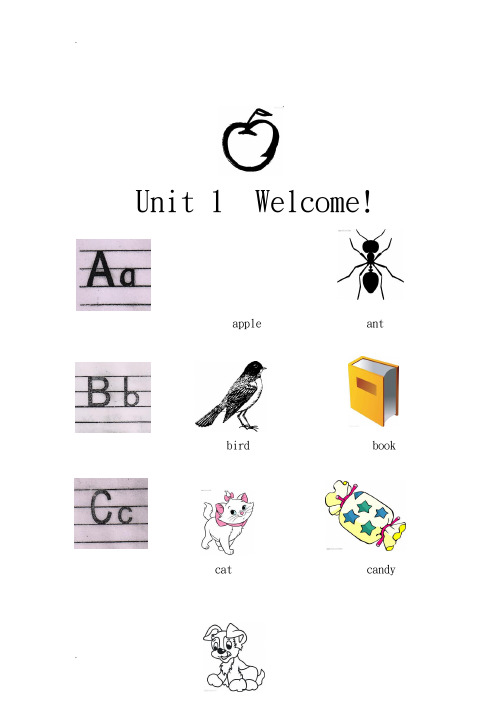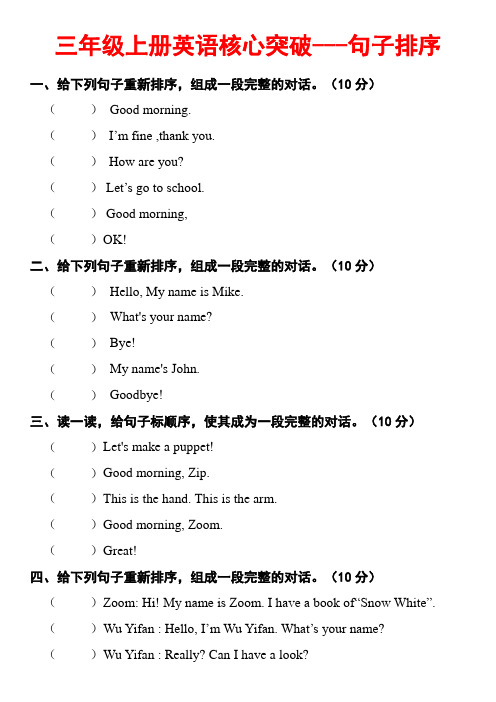英语二升三
二升三年级初学英语必备的知识

二升三年级初学英语必备的知识
初学英语的三年级学生需要掌握以下英语基础知识:
1. 字母表:学生要认识26个英文字母的大小写形式,并能准
确地发音。
2. 基本问候语:学生需要学会简单的问候语,例如:hello(你好)、good morning(早上好)、good afternoon(下午好)、good evening(晚上好)、goodbye(再见)等。
3. 数字:学生需要熟悉数字的读法和写法,从1到100。
4. 常见的颜色:学生要能够认识并说出一些基本的颜色,例如:red(红色)、blue(蓝色)、yellow(黄色)、green(绿色)等。
5. 常见的动物:学生需要能够认识一些常见的动物,例如:dog(狗)、cat(猫)、elephant(大象)、lion(狮子)等。
6. 常用的日常用品:学生需要学会一些常用的日常用品的单词,例如:book(书)、pen(笔)、pencil(铅笔)、bag(书包)等。
7. 常用的食物:学生需要认识一些常见的食物,例如:apple (苹果)、banana(香蕉)、bread(面包)、cake(蛋糕)等。
8. 基本的日常活动:学生需要学会一些基本的日常活动的单词,
例如:eat breakfast(吃早餐)、go to school(去上学)、play football(踢足球)、brush teeth(刷牙)等。
以上是初学英语的三年级学生需要掌握的一些基础知识,通过学习这些内容,学生可以逐渐建立起对英语的基本认知和理解。
二升三英语入门字母篇

Unit 1 Welcome! apple ant bird book cat candydog doorHello!Nice to meet you!Nice to meet you,too!what's your name?I'm Lily!Unit 2 A Happy Day! elephant egg foot fourgirl green hat house Scene 1:Good morning, Lily!Good morning, Tom!How are you?Fine, thank you!_______________________________________________________________________________ Scene 2:Unit 3 Holidayice cream inkGood afternoon, Lily!Goodbye! Goodbye!Good afternoon, Tom!How are you? Not so good, thank you!jacket jam key king lemon lampLily, how do you do?How do you do?what's this/that?It's an ice cream! Unit 4 Go to the zoomango monkeynose neckorange oxpen peachLily, is it a rabbit?No, it isn't.Is it a monkey? Yes, it is.Unit 5 Let's count queen QQrubber rulersix seventable teaLily, what can you see?I can see a ruler.What can you see, Tom?I can see some pens.Unit 6 How old are you? uncle upVery good vestWatermelon whiteLily, How old are you?I'm nine!1 2 3 4 5one two three four five6 7 8 9 10 six seven eight nine tenUnit 7 What colour is it?box foxyellow yo-yo zoo zebraIt's red.Unit 8 See you next time!Tom:Good morning! Nice to meet you! Lily:Nice to meet you,too!Tom:What's your name?Lily:I'm Lily! What's your name?Tom:I'm Tom! What colour do you like? Lily:I like red.What colour do you like? Tom:I like yellow.Lily:Goodbye!Tom:Goodbye!G o o d b y e!。
二升三英语小阅读

单词量:60难度:★★(满★为五颗)建议时间:5分钟MynameisMary.Iameleven.Tedismybrother.Heisthirteen.Weareinthesameschool.M ymotherisateacher.Sheisateacherinourschool.Myfatherisateacher,too.HeisaChinesetea cherinacollege.Ihaveacat.ItsnameisMimi.Itiswhite.Itisanicecat.Itisalsoaprettycat.根据短文内容,回答问题1.HowoldisMary_________________________.2.WhoisMary'sbrother____________________.3.HowoldisTed__________________________.4.AreMaryandTedinthesameclass___________________.5.IsMary'sfatheramiddleschoolteacher___________________.【词汇】1.college学院2.also也,同样3.same相同的【阅读小习惯】做第一篇阅读起告诉孩子划关键句。
很多阅读题目我们都是可以在原文中找到答案,划好关键句,确保信息准确。
单词量:74难度:★★建议时间:5分钟OnSaturday,Mrs.Greenandherdaughter,Kate,areinthesupermarket.Mrs.Greenwantst obuyashirtforherhusband.Katewantstobuysomefruit.Shedoesn'tlikepearsorpeaches.She likesgrapesandapplesverymuch.SoMrs.Greenbuysonekiloofgrapesandtwokilosofapple sforher.Mrs.Greenbuysablackscarf.Theyareveryhappy.一、根据短文内容,选择正确答案1.WhoareinthesupermarketA.Mrs.Green.B.Mrs.Greenandherdaughter.andMrs.Green.2.Katewantstobuy__________.A.somefoodB.somefruitC.somecakes3.HowmanykilosoffruitdotheybuyA.Four.B.Five.C.Three.二、根据短文内容,回答问题HowmanykilosofgrapesdoesMrs.Greenbuy_______________________________________________________【词汇】1.daughter女儿(衍生:son儿子)2.supermarket超市3.husband丈夫(衍生:wife妻子)4.kilo千克【阅读小习惯】新三年级短文回答一般会使用到一般现在时,第三人称单数永远是孩子会忘记的。
人教版二升三英语

人教版二升三英语Unit 1学习文具:pen (钢笔) pencil (铅笔) pencil-box ( 铅笔盒) ruler(尺子) eraser(橡皮) crayon (蜡笔) book (书) bag (书包) no(不)your(你的)Unit 2颜色:red (红色的) yellow (黄色的) green (绿色的) blue (蓝色的) purple (紫色的) white (白色的) black (黑色的) orange (橙色的) pink (粉色的) brown (棕色的) ok 好,行mum 妈妈Unit 3身体部位:head (头) face( 脸) nose (鼻子) mouth (嘴) eye (眼睛) leg (腿) ear (耳朵) arm (胳膊)leg (腿) foot (脚)body (身体) school (学校)Unit 4动物:cat (猫) dog (狗) monkey (猴子) panda (熊猫) duck (鸭子) pig (猪) bird (鸟) bear (熊) elephant (大象) tiger(老虎)zoo(动物园)funny(滑稽的,好笑的)Unit 5食物:cake (蛋糕) bread (面包) juice (果汁) milk (牛奶) water (水) egg(蛋)fish(鱼)rice(米饭)Unit 6数字:one (一) two (二) three (三) four (四) five (五) six( 六) seven (七) eight (八) nine( 九) ten( 十) brother(兄,弟)plate盘子二.牢记下面的对话,会让你的英语说得更棒!(A是上句,B是答句)Unit 11、向别人问好应该说――A: Hello! (你好!) B: Hi! (你好!)2、问别人的名字应该说-――A:What’s your name?你叫什么名字?B:My name’s Chen Jie. 我的名字是陈洁。
二升三年级初学英语必备的知识

二升三年级初学英语必备的知识二升三年级初学英语的学生需要掌握以下知识:1. 基本的日常用语和问候语:如Hello(你好)、Goodmorning(早上好)、Thank you(谢谢)等。
2. 基本的数字和计数:掌握1到100的数字、数字的读法和计数方法。
3. 基本的颜色和形状:认识并能用英语描述基本的颜色和形状,如red(红色)、square(正方形)等。
4. 基本的家庭成员和描述人物外貌的词语:如father(父亲)、mother(母亲)、tall(高的)、short(矮的)等。
5. 基本的动物和食物的名称:认识并能用英语说出常见的动物和食物的名称,如cat(猫)、dog(狗)、apple(苹果)、banana(香蕉)等。
6. 基本的学校用品和领域名称:认识并能用英语说出学校用品和领域的名称,如pen(钢笔)、book(书)、math(数学)、science(科学)等。
7. 基本的时间表达方式:掌握基本的时间表达方式,如What time is it?(现在几点了?)、I get up at 7 o'clock.(我七点起床)等。
8. 基本的季节和天气词汇:认识并能用英语说出季节和天气的名称,如spring(春天)、sunny(晴天)、rainy(下雨的)等。
9. 基本的方位和方位词:如in front of(在...前面)、behind(在...后面)、next to(在...旁边)等。
10. 基本的国家和国家语言:认识并能用英语说出一些国家的名称和国家语言的名称,如China(中国)、Chinese(中文)。
除了以上的知识,二升三年级的学生还需要练习听、说、读、写的能力,通过学习简单的对话、练习口语表达、朗读短文等来提高英语水平。
【二升三英语暑假】核心突破---句子排序

三年级上册英语核心突破---句子排序一、给下列句子重新排序,组成一段完整的对话。
(10分)()Good morning.()I’m fine ,thank you.()How are you?()Let’s go to school.()Good morning,()OK!二、给下列句子重新排序,组成一段完整的对话。
(10分)()Hello, My name is Mike.()What's your name?()Bye!()My name's John.()Goodbye!三、读一读,给句子标顺序,使其成为一段完整的对话。
(10分)()Let's make a puppet!()Good morning, Zip.()This is the hand. This is the arm.()Good morning, Zoom.()Great!四、给下列句子重新排序,组成一段完整的对话。
(10分)()Zoom: Hi! My name is Zoom. I have a book of“Snow White”.()Wu Yifan : Hello, I’m Wu Yifan. What’s your name?()Wu Yifan : Really? Can I have a look?()Wu Yifan : Let's go!()Zoom: OK. It is in my bag. Oh, no! It is not i n my bag. It is in Zip’s bag.Let's go and find him together.五、用数字给下列句子排序。
(10分)()Who’s there?()Hello!()Let’s play!( 3 )I’m Zip.()Hi, Zip! I’m Zoom.()Great!六、给下列句子重新排序,组成一段完整的对话。
二升三英语衔接课程表

二升三英语衔接课程表摘要:1.二升三英语衔接课程表的概述2.课程表的具体内容3.课程表的作用和意义正文:一、二升三英语衔接课程表的概述二升三英语衔接课程表是为了帮助学生顺利过渡从小学二年级到三年级的英语学习而制定的学习计划。
这一阶段的英语学习至关重要,因为它是学生打好英语基础的关键时期。
一个科学合理的课程表可以有效地帮助学生掌握英语知识,提高学习效率。
二、课程表的具体内容以下是一个二升三英语衔接课程表的具体内容:周一:1.词汇学习:学习10 个新单词,如:apple, bag, book, boy, girl 等。
2.语法学习:学习一般现在时态的构成和用法。
3.对话练习:模拟日常场景进行英语对话练习,如:自我介绍、询问时间等。
4.听力训练:观看英语动画片,提高学生的听力水平。
周二:1.词汇学习:复习周一学习的10 个单词,并学习10 个新单词,如:bird, cat, dog, door, window 等。
2.语法学习:学习一般疑问句的构成和用法。
3.对话练习:模拟日常场景进行英语对话练习,如:询问物品位置、询问意见等。
4.听力训练:听英语故事,提高学生的听力水平。
周三:1.词汇学习:复习前两天学习的单词,并学习10 个新单词,如:fish, flower, friend, girl, glasses 等。
2.语法学习:学习现在进行时态的构成和用法。
3.对话练习:模拟日常场景进行英语对话练习,如:介绍家庭成员、描述日常活动等。
4.听力训练:听英语歌曲,提高学生的听力水平。
周四:1.词汇学习:复习前三天学习的单词,并学习10 个新单词,如:key, lemon, library, mother, pen 等。
2.语法学习:学习一般过去时态的构成和用法。
3.对话练习:模拟日常场景进行英语对话练习,如:描述过去发生的事情、询问过去发生的事情等。
4.听力训练:观看英语短剧,提高学生的听力水平。
周五:1.词汇学习:复习本周学习的所有单词。
二升三英语小阅读

难度:★★(满★为五颗)建议时间:5分钟My name is Mary. I am eleven. Ted is my brother. He is thirteen. We are in the same school. My mother is a teacher. She is a teacher in our school. My father is a teacher, too. He is a Chinese teacher in a college. I have a cat. Its name is Mimi. It is white. It is a nice cat. It is also a pretty cat.根据短文内容,回答问题1. How old is Mary?_________________________.2. Who is Mary's brother?____________________.3. How old is Ted?__________________________.4. Are Mary and Ted in the same class?___________________.5. Is Mary's father a middle school teacher?___________________.【词汇】1. college 学院2. also 也,同样3. same 相同的【阅读小习惯】做第一篇阅读起告诉孩子划关键句。
很多阅读题目我们都是可以在原文中找到答案,划好关键句,确保信息准确。
难度:★★建议时间:5分钟On Saturday, Mrs. Green and her daughter, Kate, are in the supermarket. Mrs. Green wants to buy a shirt for her husband. Kate wants to buy some fruit. She doesn't like pears or peaches. She likes grapes and apples very much. So Mrs. Green buys one kilo of grapes and two kilos of apples for her. Mrs. Green buys a black scarf. They are very happy.一、根据短文内容,选择正确答案1. Who are in the supermarket?A. Mrs.Green.B. Mrs.Green and her daughter.C.Mr.Green and Mrs.Green.2. Kate wants to buy __________.A. some foodB. some fruitC. some cakes3. How many kilos of fruit do they buy?A. Four.B. Five.C. Three.二、根据短文内容,回答问题How many kilos of grapes does Mrs. Green buy?_______________________________________________________【词汇】1. daughter 女儿(衍生:son 儿子)2. supermarket 超市3. husband 丈夫(衍生:wife 妻子)4. kilo 千克【阅读小习惯】新三年级短文回答一般会使用到一般现在时,第三人称单数永远是孩子会忘记的。
- 1、下载文档前请自行甄别文档内容的完整性,平台不提供额外的编辑、内容补充、找答案等附加服务。
- 2、"仅部分预览"的文档,不可在线预览部分如存在完整性等问题,可反馈申请退款(可完整预览的文档不适用该条件!)。
- 3、如文档侵犯您的权益,请联系客服反馈,我们会尽快为您处理(人工客服工作时间:9:00-18:30)。
英语二升三
课程目标:
1.对26个英文字母达到熟背并能够规范写出26个英文字母。
2.通过学会26个英文字母在单词中的常规发音,学会准确无误拼出单词。
3.在教学过程中,学会简单英文自我介绍。
4.学会对三年级上册部分核心单词的拼读和拼写。
课程安排:
课程一
二十六个字母大A箭头指上方,小ɑ系辫好模样;
大B耳朵右边长,小b食指指向上;
大C吃饭把嘴张,小c大C一个样;
大D肚子圆又胖,小d五线谱里藏;
大E将山竖着放,小e像鱼肉真香;
大F像旗杆上绑,小f像个小拐杖;
大G让C挂条棍,小g 大辫真正长;
大H工字放倒写,小h椅子侧着放;
大I工字中间长,小i像人跪地上;
大J长得多像“厂”,小j子弹射出枪;
大K伸臂又踢腿,小k稍息把事想;
大L指针三点过,小l像根火腿肠;
大M像海鸥在飞翔,小m鼻孔出气长;大N电闪实在亮,小n单门墙上装;
大O鸡蛋喷喷香,小o蛋小人人抢;
大P圆旗高飘扬,小p让b练倒立;
大Q西瓜连藤摘,小q和9很相似;
大R和右踢腿,小r向上撅撅嘴;
大S弯弯溪流淌,小s像8没合上;
大T铁锤当当响,小t像个大写七;
大U陷阱在下方,小u将n倒着放;大V竖起两手指,小v长个尖下巴;大W是朝天躺,小w将v弄成双;大X像叉画本上,小x剪刀裁衣忙;大Y弹弓没皮筋,小y 比v多尾巴; 大Z和2最相象,小z呼噜声最响。
英语26个字母规范书写顺口溜
英语字母大小写,初学书写要规范;
大写一律上两格,原则顶住第一线。
小写有头上两格,b,d,h,k和l;
有尾下面占两格,g,q,y,p莫写错。
无头无尾中间格,十三字母无漏写。
a,c,e,m,n,o,r,s,u,v,w,x,z.写中间;
i,t中上一个半,还有f,j三格点。
所有字母略右斜,笔顺笔画须记请,
始学养成好习惯,大小宽窄要协调。
